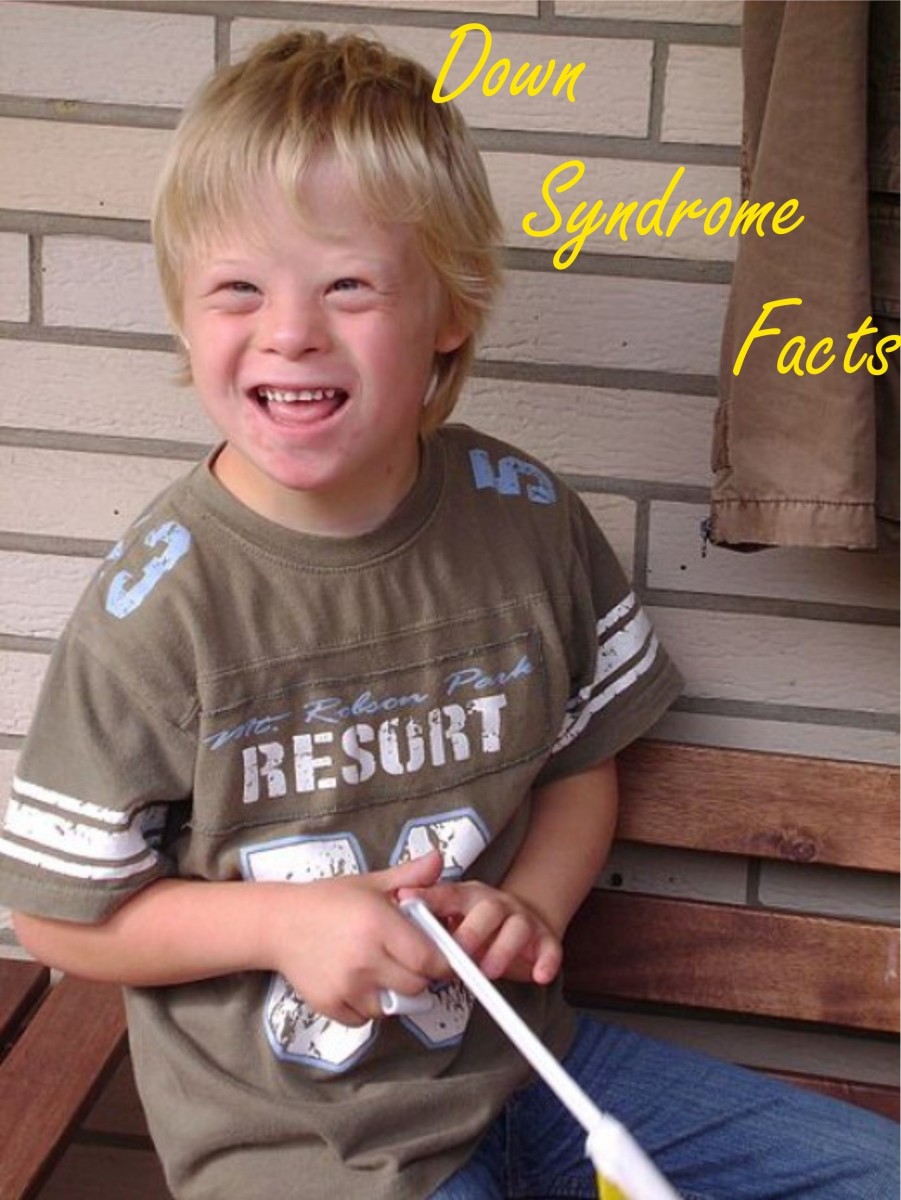Mental Birth Defects: Down Syndrome
Birth Defects: An Overview
Each year in the United States, 120,000, or 1 in 33, babies are born with a birth defect. (Facts about Birth Defects). The severity of a birth defect can range from cosmetic blemishes (such as cleft lips) or more serious, ones such as malformed hearts or hearing loss. Birth defects are personally relevant to me, since I was born five weeks early and my parents were warned of possible birth defects. Fortunately, this wasn’t the case. Many birth defects affect both mind and body. Some of these, such as Down syndrome, have no known specific cause. Others, like Fetal Alcohol Spectrum syndrome, are the direct result of the mother’s actions during pregnancy. This paper examines those birth defects, their prenatal risk factors and how they affect the patient’s mental capabilities.
While birth defects can occur at any stage of pregnancy, the window of two weeks to the beginning of the third month is most vulnerable for the baby. This time frame, the embryonic stage, is when the baby’s basic physiological structures are being formed. Small interferences can be devastating, and the majority of miscarriages occur during this time. For those that survive, structural damage often remains, affecting areas such as the heart, brain and spine. (Weiten 433-434). A mother gives birth to a baby with a birth defect every four and a half minutes in the U.S. (Facts about Birth Defects).

What Kinds of Birth Defects Are There?
Some birth defects affect a recognized pattern of bodily processes and parts. These can generally be broken down into two categories: those that are structural and those that are developmental in nature. Structural birth defects are related to a structure in the body, its specific parts or shape. This includes cleft lips, heart defects, spina bifida and abnormal limb development, including conditions such as clubfoot. The latter category, developmental birth defects, affects how a specific bodily system functions. These often lead to intellectual or developmental disabilities. Developmental birth defects include nervous system issues such as Down syndrome, sensory problems such as deafness or blindness and degenerative disorders such as muscular dystrophy (What Are the Types of Birth Defects?).
Down's Syndrome
Do you know anyone with Down's Syndrome?
Down Syndrome: Unavoidable and Tragic
Down syndrome is a developmental birth defect, affecting the patient’s nervous system and how their body and brain develop (What Are the Types of Birth Defects?). Those with Down syndrome have an extra copy of their 21st chromosome, bringing the total count up from 46 to 47. This is called trisomy. The baby’s extra chromosome changes how it grows and develops, resulting in significantly lower intelligence and difficulty speaking. A shorter neck, small ears, a tongue that tends to hang out of their mouths, almond shaped eyes slanting upwards, a flatter face, and short height are all common symptoms of this defect. It is the most commonly diagnosed chromosomal condition in the US and is a lifetime condition with no cure (Facts about Down Syndrome).
- Mental Birth Defects: Fetal Alcohol Spectrum Disorders
Mental defects and illnesses come in many forms, but Fetal Alcohol Disorders are entirely preventable and often entirely incapacitating, ruining hundreds of thousands of little lives.

What Causes Down Syndrome?
While researchers know that trisomy causes Down syndrome, they’re unsure why it occurs, or whether it’s environmental or genetic (or both). There are, though, certain risk factors: Older mothers above the age of 35 tend to have more babies affected by Down syndrome (Facts about Down Syndrome). It’s not clear whether this is a causal or correlative relationship, however.
The Three Kinds of Down Syndrome
There are three varieties of Down syndrome: Trisomy 21, Translocation Down syndrome, and Mosaic Down syndrome. The first, Trisomy 21, is by far the most common with 95% of those diagnosed with this defect falling into this category. This occurs when there are three, rather than two, copies of chromosome 21 in each cell. Translocation Down syndrome is the second most common at 3%; this happens when an extra part or entire chromosome 21 exists, attached to a different chromosome instead of being separate. The last, Mosaic Down Syndrome, is just what its name implies: a mixture of two and three copies of chromosome 21 in each cell. It affects just 2% of those with Downs, but people with this type may exhibit fewer features of normal Down syndrome because not all cells having three copies of chromosome 21 (Facts about Down Syndrome).
Those With Down Syndrome Can Still Lead Fulfilling Lives

How Down Syndrome Affects a Patient
Mentally, those suffering from Down syndrome are “behind the curve”. Perhaps the most obvious manifestation of this is in the patient’s difficulty in speaking and sluggish language development. Though there are individual variances, most Downs children are late in saying their first words and expand their vocabulary at a markedly slower pace than normally developing children. They use the same general two-word sentences as other youngsters, but exhibit difficulty in mastering grammar and basic word organization (Buckley). According to Sue Buckley in Language development in children with Down syndrome - Reasons for optimism:
"This leads to the speech of many teenagers and adults with Down syndrome being restricted to short telegraphic utterances (keywords without the function words, for example "went swimming Dad" rather than "I went swimming last night with my Dad")"(Buckley).
Pronunciation, too, is often a challenge. The overall effect is that Downs children tend to be difficult to understand, particularly from a stranger’s perspective. This difficulty in communication has far-reaching consequences for the child’s cognitive development (Buckley).
As the child with Downs grows, their communication deficit impacts them in more and more meaningful ways. They are either unable or have a difficulty using language to learn about and experience the world around them. Understanding concepts and ideas is overly challenging or simply not feasible (Buckley).
In the same fashion, cognitive functions are also hampered. Buckley continues in the same article:
"Once we have begun to master a language, we think in terms of words, we reason, recall and do mental arithmetic in words either silently or aloud. For example, according to our current understanding of short-term memory functioning, (which is essential for most mental processes), it is based on silent speech and develops as children's speech facility increases." (Buckley).
Due to their poor language skills, those with Downs have difficulty in basic cognitive functions. Memory encoding and retrieval is also hampered; it’s difficult to mentally “group” and process similar items with each other like animals or shoes (Buckley). Down syndrome has a profound impact on a patient’s lifetime mental capabilities.
- Emotional Intelligence: The Key to Success in Romance, the Workplace, and Life
What is emotional intelligence? How does it affect your workplace, love life and interpersonal relationships, and is it possible to improve upon what emotional intelligence you already have?
Raising a child with special needs
How would you feel about raising a child with Down Syndrome?
© 2015 Nu Vew








